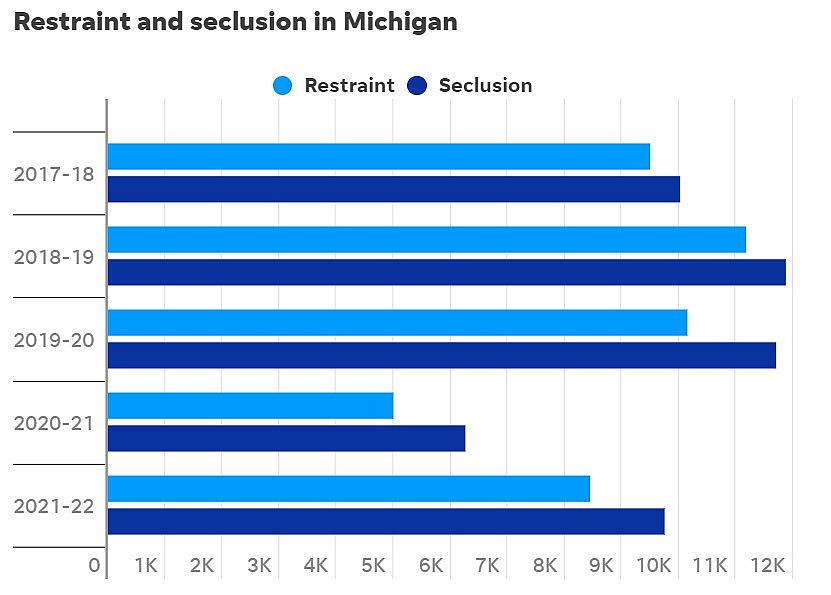Gov. Whitmer: 'Clear' Michigan lawmakers can improve seclusion and restraint laws
The story was originally published in Detroit Free Press with support from the USC Annenberg Center for Health Journalism's 2022 National Fellowship.

SOURCE Michigan Department of Education
Gov. Gretchen Whitmer says Michigan should improve how it regulates the usage of a controversial tactic educators deployed nearly 94,000 times since lawmakers tried to tamp down on the maneuvers, frequently used on children with disabilities in a manner experts believe can cause lasting trauma.
Leading Democrats in the state House and Senate echoed the call, with one saying the findings of a recent Free Press investigation that showed educators rampantly secluding and restraining children in educational settings despite laws meant to reduce both practices indicates "the need to revisit the issue."
In a statement last week, Whitmer spokesman Bobby Leddy said the state can do more to curtail how adults use seclusion and restraint in educational settings.
“Former Lt. Governor (Brian) Calley made great strides to limit these practices, but it’s clear that there could be improvements to the law, which already prohibits seclusion and restraint except in emergency situations, to keep students, teachers, support staff, and education professionals safe. We are eager partners with anyone who wants to take proven steps to protect students," Leddy said in an emailed statement.
“If we are going to reach our goal of becoming a top 10 state for education, we must continue addressing decades of disinvestment and holding everyone accountable for the safety and success of our students.”

A spokesman for Gov. Gretchen Whitmer said "it's clear" legislators can improve laws regulating how and when educators use seclusion and restraint in Michigan schools. Ryan Garza, Detroit Free Press
Seclusion involves placing a child in an isolated setting for anywhere from a few minutes to more than an hour, while restraint entails adults physically controlling students. A Free Press investigation recently found educators used the tactics roughly 94,000 times in the last five school years, despite experts across the country decrying the substantial harm that can come from seclusion and restraint.
The investigation also found school districts flouting either the spirit or letter of laws aimed at ultimately ending the usage of either tactic while attempting at times to charge tens of thousands of dollars for public records.
Calley, a Portland Republican, worked in 2016 with a bipartisan group of lawmakers to change how and when educators can use either seclusion or restraint. The laws, which also required more robust data collection, were intended to ultimately phase out the use of both tactics.
“Of all my time in office, and all the initiatives that I worked on, the degree of difficulty in getting a ban on seclusion and restraint practices in schools is perhaps the most discouraging,” Calley, now president of the Small Business Association of Michigan, told the Free Press earlier this year.
House Democratic Leader Donna Lasinski, D-Scio Township, also noted her support for the legislative package in 2016. While she could not run for reelection due to term limits, she said in a statement Monday she expects lawmakers to review seclusion and restraint laws soon.
“Seclusion and restraint should always be a last resort, and these findings show how important it was for reporting requirements to be included in the 2016 changes and the need to revisit the issue. I supported this legislation and know that my fellow Democrats will continue working to improve our children’s education system to provide the best outcomes possible for everyone involved," Lasinski said.
Soon-to-be Senate Majority Leader Winnie Brinks, D-Grand Rapids, agreed.
“Every child deserves to feel safe at school. Democrats have been calling for changes to restraint and seclusion policies for years, and in the new year we will have the opportunity to bring teachers, administrators, parents, students, and special education experts together to address this issue," Brinks said in a statement Monday.
Whitmer's team did not identify specific changes in law she would support. Generally, the governor speaking out in favor of legislative changes can jump-start action at the statehouse, especially on issues that have received bipartisan support in the past. Republicans currently control the state House and Senate, but Democrats take power in both chambers early next year.
“I’m disappointed this is something that wasn’t accomplished during this session but I know the incoming Democratic leadership is concerned about how we can make schools a safer place for every student," said current Senate Minority Leader Jim Ananich, D-Flint, who also could not run for reelection due to term limits.
"I expect that they will look closely at this issue and put forth a better policy.”
Current and incoming Republican leaders in both legislative chambers did not immediately respond to questions about changes to seclusion and restraint laws. House Speaker-elect Joe Tate, D-Detroit, also did not immediately respond.
In an opinion piece responding to the Free Press investigation, Autism Alliance of Michigan President and CEO Colleen Allen called the seclusion of children with diagnosed disabilities "inhumane." She said she's working with Rep. Julie Calley, R-Portland, who is married to Brian Calley, on legislation to "eliminate barriers to inclusion of behavior analysts and other medical and behavioral health clinical professionals in a school setting."
Rep. Julie Calley, who is also term limited, said in an email she wants to pursue these reforms immediately, during the upcoming lame-duck session. She said under the proposed bills, schools would be required to create a policy dictating how children with a prescription from a qualified health care professional can receive medically necessary treatment during school hours.
"For students in behavioral therapy services, they may be much more independent or cooperative in a clinical setting than in school. The skills that they learn in treatment don’t automatically transfer into the classroom. I have personally seen this in my own daughter," said Calley, who has a daughter diagnosed with autism.
"Our schools are currently required to integrate evidence-based behavior interventions and supports. However, schools are often short-staffed and lack the time and training necessary to implement a multi-tiered framework of supports that includes detailed data collection."
Calley said her proposal would lead to less emergency seclusion and restraint, less time out of classroom for students in the midst of a crisis and better overall outcomes for these children.
Lawmakers resume their legislative schedule this week but are not expected to meet in earnest until next week. There's a legitimate chance any substantial law changes may have to wait until the new legislative session begins in January, due in part to the political power shift at the Legislature.
Contact Dave Boucher: dboucher@freepress.com or 313-938-4591. Follow him on Twitter @Dave_Boucher1.


